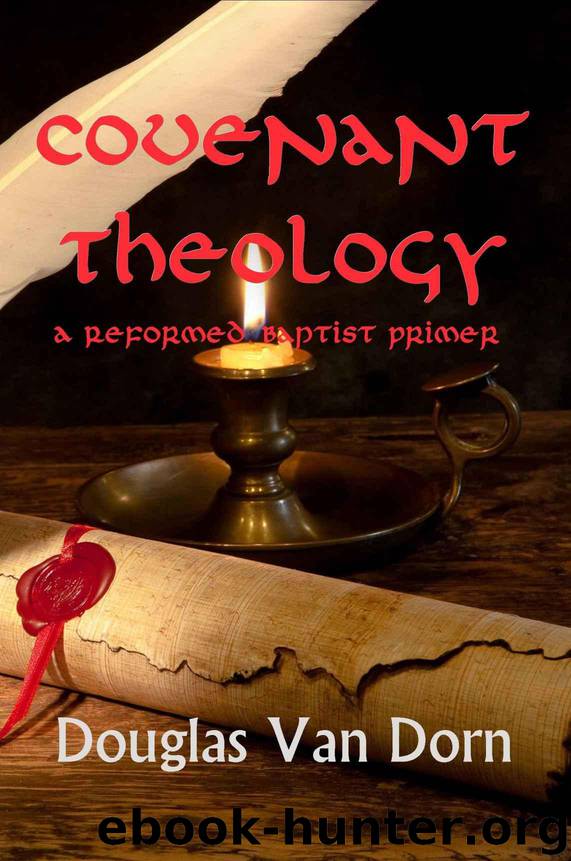Covenant Theology: A Reformed Baptist Primer by Van Dorn Douglas

Author:Van Dorn, Douglas
Language: eng
Format: azw3
Publisher: Waters of Creation
Published: 2014-11-02T16:00:00+00:00
The Law and This Covenant
At this point, because the Mosaic covenant is one of the most misunderstood of all biblical covenants, we want to make a few important observations. First, it is not everything in the Law (i.e. Torah) which is, properly speaking, the Mosaic covenant. Rather, it is the Ten Commandments and those aspects of the Law which elaborate them. These elaborations may be thought of as Israel’s “case law.” The Reformed call them judicial law or civil law. Case law is the specific application of a moral law or principle to a given situation in the national life of a people. In the instance of Israel, this was temporary case law commanded by God through Moses to give to that people to order its civil affairs.
For example, a man dies with leaving only daughters, but there are no provisions for passing on his land to daughters; what should we do about this? A boy picks up sticks on the Sabbath day; what should we do with him?[78] Moses is too burdened to judge all the people, how do we settle this problem? It is probably the case that all case law relates to the Ten Commandments. Yet, there are still other (ceremonial) laws in the Pentateuch, but these are not properly speaking part of the Mosaic covenant. We discuss these in the next chapter.[79]
Second, the Ten Commandments are themselves a republication of the eternal moral standards that God built into the very fabric of creation and published more generally on the human heart in the Covenant of Works. There are a couple of things to flesh out here. First, notice I said a republication of the eternal moral standards, not a republication of the Covenant of Works. Second, the Mosaic Covenant is not, properly speaking, the Covenant of Works, though as we said in the Introduction to these OT covenants, it could be and often was approached as if it were.
Third, recognize that it isn’t like no one knew that it was wrong to murder prior to Mt. Sinai or that God did not hold men accountable to it. Some Christians give the impression by their view of “we are not under law but under grace,” that it is almost as if God came down to Moses and created these Ten Commandments out of thin air just for these Israelites and no one else. But Cain murdered his brother (Gen 4:8) long before God told Moses, “You shall not murder” (Ex 20:13), and God held him accountable for that action (Gen 4:10-12). Indeed, we find violations and awareness of every one of the Ten Commandments prior to Mt. Sinai.[80] Of course, even pagan law codes such as Hamurabbi knew of them.
Fourth, everyone knows what they are supposed to do, at least generally speaking, in terms of the Ten Commandments—because all people are born with the law written on their heart (Rom 2:15). This law was embedded into creation in the Covenant of Creation as I have shown. I
Download
This site does not store any files on its server. We only index and link to content provided by other sites. Please contact the content providers to delete copyright contents if any and email us, we'll remove relevant links or contents immediately.
| Anglican | Baptist |
| Book of Common Prayer | Calvinist |
| Episcopalian | Inspirational |
| Lutheran | Methodist |
| Pentecostal & Charismatic | Presbyterian |
| Quaker | Seventh-Day Adventist |
| Shaker | Theology |
Angels by Billy Graham(1922)
How To Be Born Again by Billy Graham(1775)
Peace with God by Billy Graham(1681)
Unbroken Curses by Rebecca Brown & Daniel Yoder(1571)
God's Prophetic Symbolism in Everyday Life by Adam Thompson & Adrian Beale(1492)
The School of Biblical Evangelism by Ray Comfort(1435)
Call by Rick Joyner(1423)
Martin Luther: The Man Who Rediscovered God and Changed the World by Eric Metaxas(1387)
Power over the Enemy by John Osteen & Joel Osteen(1351)
Fresh Wind, Fresh Fire by Jim Cymbala(1231)
Jonathan Edwards: A Life by Marsden George M(1231)
Liturgy of the Ordinary by Tish Harrison Warren(1217)
Prayers That Bring Healing and Activate Blessings: Experience the Protection, Power, and Favor of God by John Eckhardt(1215)
Unmasking the Devil: Strategies to Defeat Eternity's Greatest Enemy by John Ramirez(1202)
The Supernatural Power of a Transformed Mind Expanded Edition: Access to a Life of Miracles by Bill Johnson(1197)
An Altar in the World by Barbara Brown Taylor(1192)
Reformation Theology by Littlejohn Bradford(1184)
Martin Luther by Mansch Larry D.; Peters Curtis H.;(1130)
Seeing the Voice of God: What God Is Telling You through Dreams and Visions by Smith Laura Harris(1125)
